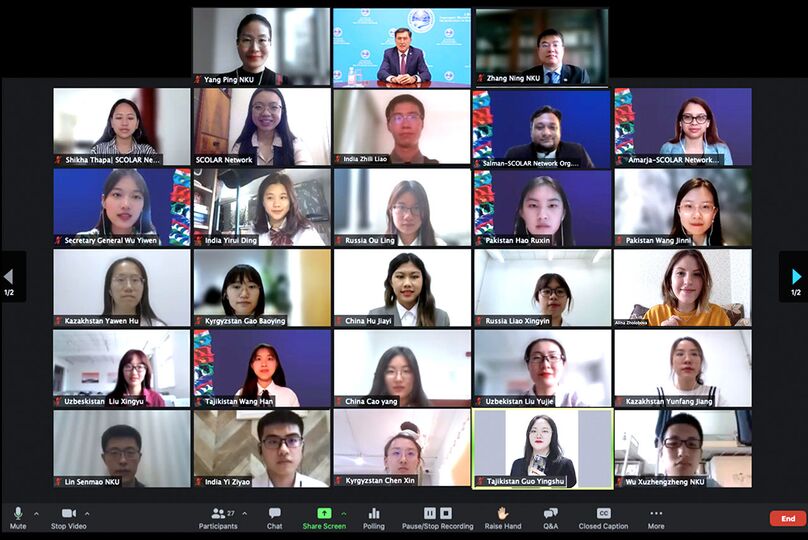On 22 May 2021, Nankai University in Tianjin was the venue for the SCO Model interactive game dealing with the SCO's 20th anniversary, the experience of cultural exchanges and a perception of the future. The event was organised by Nankai University together with the SCOLAR Network Youth Platform. In all, 17 students from nine faculties represented nine delegations, including SCO member states and the SCO Secretariat.
In his welcoming remarks, SCO Secretary-General Vladimir Norov praised the University's management for getting their students involved in the activities of the Shanghai Cooperation Organisation.
Mr Norov noted the SCO's effective efforts to achieve the following goals, namely, to strengthen dialogue between the young people in the SCO region, create essential conditions for realising their potential and, most important of all, to protect young people from the deleterious influence of terrorist and extremist forces. He also noted that the future development of the entire region of the SCO depended on the involvement of young people in adopting responsible political decisions.
The SCO Secretary-General noted that the SCO Model interactive game allowed students to gain an insight into the SCO's goals and tasks, as stipulated by its Charter, and the principles of the Shanghai Spirit.
Nankai University President Cao Xuetao thanked SCO Secretary-General Vladimir Norov for co-sponsoring the event. In his welcoming remarks, he expressed confidence that the SCO had been one of the most effective international organisations during the pandemic. The organisation of the SCO Model game at Nankai University has special significance this year because the SCO is marking its 20th anniversary. The current year has also been proclaimed the Year of Cultural Exchanges.
During the three-hour game, the delegates discussed several initiatives, including the possibility of establishing the Youth Education Network among SCO member states for conducting academic and cultural exchanges. Delegation members also suggested an initiative for actively using social media networks to raise public awareness of the SCO region's cultural heritage, including the creation of video, sound and text content by young people who can act as young ambassadors of the SCO countries.
The delegates discussed a proposal on holding an annual cultural festival in states chairing the SCO, and other SCO countries would set up their fairs and pavilions during the event.
The following delegates won the SCO Model game:
• Best Report category: Ding Irui and Liao Rili (Delegation of India)
• Best Delegate category: Wang Hang (Delegation of Tajikistan)
• Best Debut category: Wu Iwen (Delegate of the SCO Secretariat)
• Best Report category: Ding Irui and Liao Rili (Delegation of India)
• Best Delegate category: Wang Hang (Delegation of Tajikistan)
• Best Debut category: Wu Iwen (Delegate of the SCO Secretariat)
The SCO Model educational interactive game / simulated conference simulates the work of the Shanghai Cooperation Organisation's bodies. The game involves high school pupils and university students wishing to research the functions of the SCO bodies and their work.
The game has educational purposes and allows participants to study international relations and diplomacy, to improve their writing and negotiating skills, to work with their team-mates, to conduct discussions and to build upon new ideas and projects.
